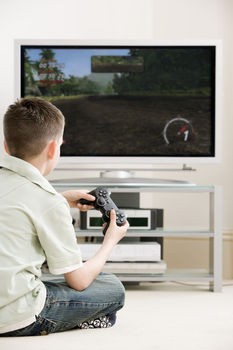Much of what clinicians and parents know about ADHD and video game use is anecdotal and observational in nature. Parents frequently report that their children with ADHD play video games too much or too intensely. At the same time, they also observe the capacity for sustained effort and attention their kids exhibit while playing video games. Some parents question whether their children even have ADHD when they see how they can focus so diligently on a video game. Why is it some kids can’t seem to focus on a reading assignment, but can sift through hours of text while following the story in a role-playing game? Such intense focus on video games is also observed in other electronic activities such as viewing television, social networking, using the Internet, and texting. As psychologists and educators observe these behaviors, it is important to understand how children with ADHD consume digital media differently than their typically-developing peers.
How Much Time Do Kids with ADHD Play Video Games?
Most of the research suggests that kids with ADHD are similar to their peers when it comes to their use of digital media, spending an incredible amount of time and energy plugged in or in front of a screen. The Kaiser Foundation reported in 2010 that the typical American child 8 to 18 years old spends an average of 7 hours 38 minutes a day using digital media. When multitasking (for example, texting while watching television or listening to music) is taken into account, they spend more than 10 and a half hours a day with media. A 2008 study by the Pew Internet & American Life Project found that 99% of boys and 94% of girls played at least some video games.

Most of the data suggest that children with ADHD are fairly similar to their typically-developing peers in their use of games and apps. For example, in a 2012 study conducted in France Stephanie Bioulac found no significant difference in the frequency or duration of play between ADHD and typically-developing children ages 10 to 12. Recent data collected by Ravi Linginerni and colleagues in a large cross-sectional study of more than 65,000 children in the United States indicated that 90% of ADHD children spend more than one hour a day on the computer as compared to 80% of typically-developing children. A 2006 longitudinal study of 149 adolescents in Milwaukee, Wisconsin by Mariellen Fischer and Russell Barkley found no difference between children with ADHD and aged-matched controls in terms of their amount of video-game play. However, there was more inter-individual variability in the ADHD population, suggesting that some teens with ADHD can become excessive in their game play. This finding is consistent with what many parents and mental health professionals observe, suggesting caution in accessibility to digital media for some children with ADHD.
LearningWorks for Kids studies of video-game play amongst children diagnosed with ADHD did not suggest that children with ADHD use digital media more than their peers. Sixty-six percent of parents reported that their children played video games less than 1 hour a day in a sample of 105 children diagnosed with ADHD through a full neuropsychological evaluation. The LearningWorks for Kids study did indicate that video games are the second most used technology after television for children with ADHD, in contrast to typically-developing children, for whom they come third after music.
How Do Children with ADHD Perform in Video Games?
 There is also evidence that children with ADHD may play games somewhat differently than their typically-developing peers. Two studies by Vivienne Lawrence of Australia indicated that children diagnosed with ADHD process information differently than their peers, completing fewer challenges in video games and sometimes processing video-game information somewhat slower. In contrast, a study by Rebecca Shaw that used the video games Crash Bandicoot and Frogger to investigate inhibitory performance of children with ADHD found no difference between ADHD and typically-developing children.
There is also evidence that children with ADHD may play games somewhat differently than their typically-developing peers. Two studies by Vivienne Lawrence of Australia indicated that children diagnosed with ADHD process information differently than their peers, completing fewer challenges in video games and sometimes processing video-game information somewhat slower. In contrast, a study by Rebecca Shaw that used the video games Crash Bandicoot and Frogger to investigate inhibitory performance of children with ADHD found no difference between ADHD and typically-developing children.
There are data that suggest that children with ADHD tend to perform better with video games or digital technologies than they do on paper-and-pencil tasks. A study comparing computers to analog technologies on neuropsychological testing found that children with ADHD performed better on the Wisconsin Card Sorting Test computerized version as opposed to a traditional deck of cards, in contrast to typically-developing children, whose performance was the same on both measures. Children with ADHD were able to close the gap with typically-developing children when they could use the computerized version of this test. A variety of other studies has demonstrated that children with ADHD perform better in math and reading when video and computer games are used in conjunction with traditional education as compared to just typical classroom instruction.
Conclusion
Taken as a whole, the current research suggests that kids with ADHD generally play video games about the same amount of time as their peers but may choose video and computer games over other media. In addition, some children with ADHD may be prone to overuse. It appears that some of the same processing issues that may impact cognitive efficiency amongst children with ADHD may be observed in their video game use. However, the data also suggest that these children tend to improve more than their peers when given an opportunity to use games and technology instead of traditional learning tools, due in part to enhanced attention and motivation towards the technology.




